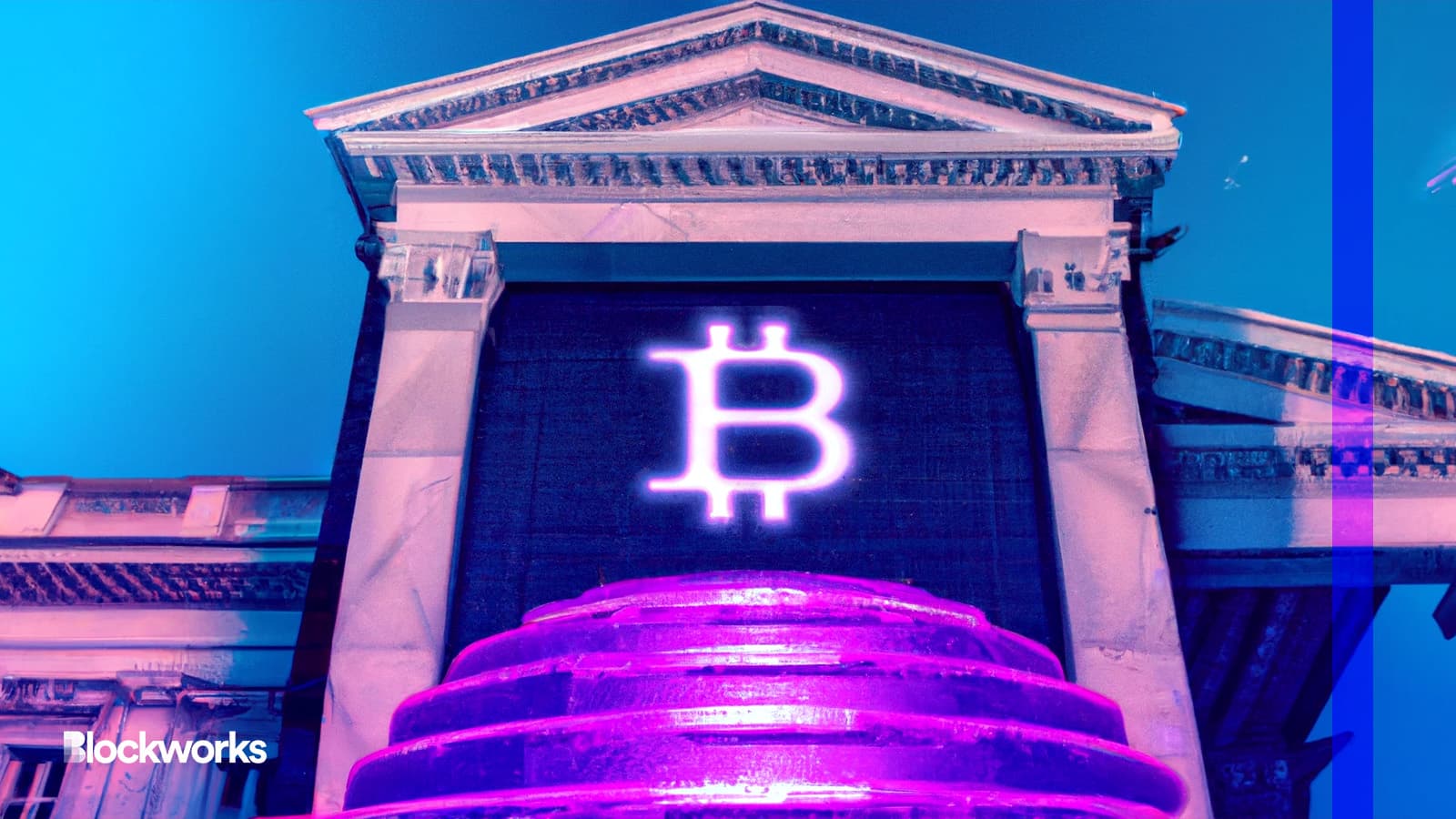Silvergate, Signature Bet Big on Crypto: What Do They Actually Do?
Prominent crypto companies are moving away from Silvergate amid insolvency concerns

Dall-e modified by Blockworks
A slew of Silvergate’s top revenue-generating clients are ditching the beleaguered crypto-focused bank, triggering a rush to ink arrangements with the company’s competitors.
The move, which stemmed from Silvergate saying it would delay its annual report detailing the firm’s finances, has already triggered reverberations within the crypto industry.
Silvergate’s stock — which had already traded at deeply depressed valuations from its height — dove an additional 50% on the news. Longtime clients of several Silvergate divisions have called it quits, and the expectation of industry participants is that the exodus isn’t yet over.
Coinbase, one prominent example, has since decided to switch out Silvergate as its banking partner. The bank formerly facilitated voluminous cash-based transactions on behalf of the exchange’s prime brokerage clients. Coinbase has moved to Silvergate competitor Signature Bank.
“In light of recent developments and out of an abundance of caution, Coinbase is no longer accepting or initiating payments to or from Silvergate and will be facilitating institutional client cash transactions with our other banking partners,” a Coinbase spokesperson told Blockworks.
Prime brokerage clients in digital assets — including hedge fund firms and proprietary trading operations, as well as family offices — are cash cows for the digital assets sell-side service providers that clear their trades and custody their cryptoassets.
It’s too early to tell what impact the Silvergate shake-up may have on baseline industry fees, as well as related service provider agreements, imposed on clients. Crypto’s biggest players are paying close attention.
A number of firms with Silvergate ties have downplayed their own involvement in the Silvergate fallout.
Coinbase’s move echoes that of LedgerX — one of the handful of solvent subsidiaries of the now-defunct FTX — which instructed clients to send wires to Signature instead of Silvergate.
Crypto broker Paxos, too, will be ditching Silvergate — discontinuing SEN transfers and wires to its Silvergate accounts. Paxos was the issuer of stablecoin Binance USD, which is currently seeing billions in cash redemptions.
“Paxos will continue to process outgoing payments,” a Paxos spokesperson told Blockworks. “Paxos does not have any material exposure to Silvergate. Paxos’ priority has always been the protection of its customers’ funds and assets, and as such we leverage a diverse network of banking partners.”
Silvergate’s role in cryptocurrency
In many ways, Silvergate and Signature were traditional financial institutions that took big, bold risks in a bid to integrate cryptocurrencies into the mainstream.
Founded by Derek Eisele in 1988, Silvergate started as a small community lender in La Jolla, California. Eisele’s then-startup maintained a real estate focus at the time.
In 2013, the bank bet on digital assets, when cryptocurrencies were seldom accepted in the wider financial community — and when Wall Street’s most influential players barely knew what a digital asset really was.
The reluctance then stemmed from concerns about bitcoin and other cryptoassets being linked to illicit activities. Silvergate, meanwhile, took in crypto clients, including exchanges. The firm set its early customers up with basic banking services that had been virtually nonexistent in the US previously.
Over the next few years, Silvergate rapidly grew to become one of the most prominent banks in crypto. It brought aboard customers left and right, from centralized exchanges to stablecoin issuers.
Its most important feature, and the one that likely cemented its industry standing, was the introduction of the Silvergate Exchange Network (SEN) — a real-time, API-enabled platform — which enabled instant and off ramp access to fiat currencies at any time.
Most traditional banks, at least in the US, operated only between the hours 9-5 between Monday to Friday at the time.
The bank went public in 2019 at $12 a share. Its stock price would go on to climb to over $200 in late 2021. The once hot crypto stock has since plummeted, marking an all-time low of $7.57 at the time of writing.
Silvergate’s downfall started with the collapse of FTX
FTX was one of Silvergate’s most prominent clients. Following the exchange’s demise, events which shook up the entire industry, Silvergate booked losses of $1 billion.
Customers withdrew more than $8 billion, according to Silvergate’s fourth quarter reports. And the bank slashed its headcount by 40%.
Wait, what about Signature?
New York-based full-service commercial bank, Signature, has also been affected by the cryptocurrency bear market.
Signature is one of the only other banks that offer instantaneous payments in US dollars.
Signature — a direct Silvergate competitor for years — said the firm has been distancing itself from the digital asset world following a “challenging cryptocurrency environment,” on a year-end earnings call.
“We’re not just a crypto bank and we want that to come across loud and clear,” Signature’s chief operating officer Eric Howell said at a conference in December.
Apart from cryptocurrencies, Signature also provides investment advisory services, asset management and insurance products and is a licensed broker-dealer.
Most recently, centralized exchange Kraken made the call to move away from the bank after it told Binance it would no longer support SWIFT transactions under $100,000.
Signature’s decisions follow increased pressure from the Federal Reserve, Federal Deposit Insurance Company (FDIC) and the Office of the Comptroller of the Currency (OCC).
All of the US government financial entities have issued statements warning banks to be extremely cautious when it comes to crypto — although none have prohibited, or even discouraged, banks from entering the space.
Michael Bodley contributed reporting.
Get the news in your inbox. Explore Blockworks newsletters:
- The Breakdown: Decoding crypto and the markets. Daily.
- 0xResearch: Alpha in your inbox. Think like an analyst.






